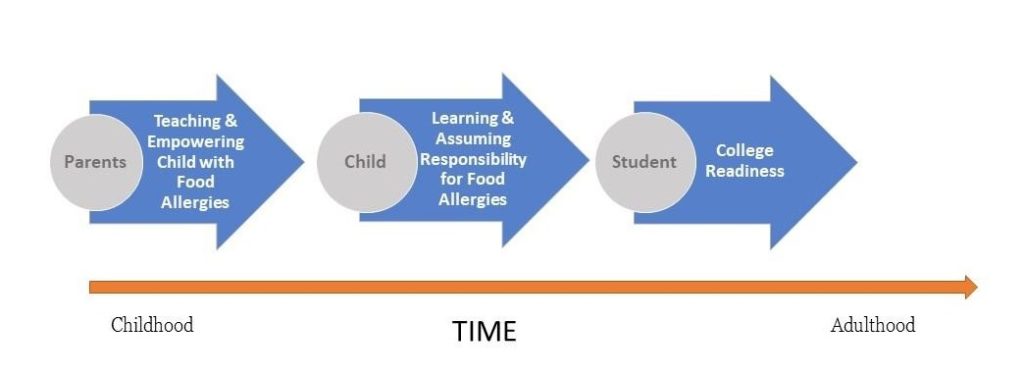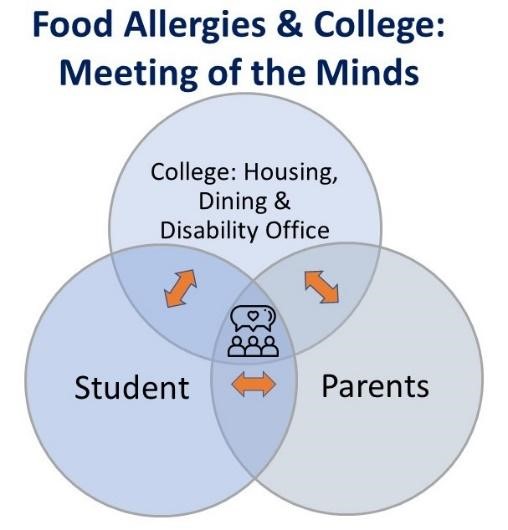Over the course of the two-day Food Allergy Symposium for Industry 3.0 hosted by Betsy Craig and MenuTrinfo, attendees increased their food allergy IQ and EQ, learning from presentations by experts in food manufacturing, food services, allergen training and certification, immunology, education/student dining services, disability rights and advocacy.
The Food Allergy Bubble is Coming
All those babies and young children diagnosed with food allergies in the early 2000’s are either in college or soon will be.
An estimated 3.7 million students will graduate from high school in the 2020-2021 school year. In non-pandemic impacted years, between 60 and 70% of those students continue their studies at the college level in the US. If you assume 8% to 10% of that population has food allergies, that would mean that some 200,000 and 240,000 members of the incoming Class of 2025 will have some kind of food allergy.
College bound students should never have to rule out applying to a great school because they’re fearful it can’t handle their food allergies. Colleges are being challenged more than ever before with ensuring that new students with food allergies have a college experience that’s similar to other students.

Mary Vargas Esq., Partner at Stein & Vargas LLP, suggests that, “Students with food allergies need reassurance from colleges that they will be welcomed, cared for and valued.” Parents also need reassurance that their student will be able to safely participate fully in all the school offers, and that food will not be a barrier to enjoying a full college experience—food’s importance will fade into the background.
Food Allergy ‘Ownership’ is Transitioned Gradually, Over Years
Sending a teen off to college can be worrisome for any parent — fraught with uncertainty mixed with hope.
As a parent of a teen with food allergies, your worries multiply because you will no longer be present – real time — to be their emergency failsafe. You wonder if you’ve empowered them sufficiently with the skills they will need to make safe food choices and handle allergic reactions without you. You second guess yourself. You hope the dining services team is up to the task of feeding your loved one safely, meal by meal, day by day. You’re anxious because you’ve read that every three minutes a food allergy reaction sends someone to the emergency room, and you pray it won’t be your college student.
Families have to do their part, from early childhood through high school, educating their child with food allergies how to manage them 24:7.

The knowledge base (aka, the ‘ownership’) is transferred gradually over years and it’s not an inconsequential body of knowledge.
- What are my allergens?
- What do my allergic reactions look like? Feel like? What’s my emergency action plan?
- How do I decipher a food label? Where could my allergens hide on a food label? How do I interpret Precautionary Allergen Labelling (PAL)? What’s my threshold for accepting PAL risk?
- Can I clearly explain my allergies and cross contact to other people? Can I get comfortable explaining my allergies to people much older than me?
- What questions do I need to ask at restaurants to determine if I can safely eat there? Who should I talk to? When should I ask? What should I do if the answer is ‘no’? What workaround strategies might keep me safe?
- Where should I keep my auto injector? How can I remember to take it every time I head out?
- How do use my auto-injector? What do I do if it’s expired? How/where do I renew the prescription?
Can the college your student wants to attend accommodate students with severe food allergies so they not only survive, but thrive?
That’s the question allergy parents must ask themselves.
When a student with food allergies goes to college, they have to talk to their schools and advocate for themselves. “It’s likely the first time they’ve had to advocate for themselves,” Mary explained, adding “While the school is encouraging students to self-advocate, parents are terrified because they’re accustomed to advocating, and they’re afraid their child will die.”

Betsy Craig suggests five questions families should explore with their college picks to evaluate school food allergy management capabilities:
- What are your emergency procedures for addressing an allergic reaction?
- How many allergic reactions have happened on campus? If any, what steps did you take to prevent future incidents?
- Has your dining services team been trained in food allergy? If so, how? If not, when?
- Have housing + RA’s been trained in food allergy? If so, how? If not, when?
- What dining options on campus will always be safe? Are there Certified Free From options?
Food Allergies & Celiac Disease — Under the Protection of the Americans with Disabilities Act
“It used to be that food allergies were not considered a disability,” Mary explained. When the Americans with Disabilities Act was passed, Congress defined what it meant to be a person with a disability. Subsequently, courts chipped away at the definition, unreasonably narrowing it. Eventually, Congress clarified the definition of ‘disability’ and as a result, people with food allergies and Celiac Disease are now considered Americans with disabilities and come under the protection of the disability law. The law does not guarantee the same experience, but meaningful {i.e., like} access.
But what does ‘like’ mean?
“College is a bridge to life.”
“College forms who you are,” Mary reflected, adding that, “so much of that formative process does not happen in the classroom. It happens in the dining halls, at social events where food is served, at athletic events—home and away.”
When a college student has a disability, the intent of the ADA is for colleges to look at the student experience for students without disabilities and try to give a student with a disability a like experience. Mary suggested that “When you do this well, it speaks well of your school and how your school values each and every student.” Schools should be thinking, “What do we need to do to value this person and keep them safe? How do I make sure this person’s experience is like others?”
For students with food allergies, like means they can go to a dining hall that’s close enough. It means they can get a warm meal. They don’t have to eat packaged food from their backpacks to survive. Their dorm rooms are a safe haven.
“Mistakes happen. It’s how you respond that makes the difference.”
Mistakes happen. Everyone makes mistakes. “What’s important is how schools respond when mistakes are made,” explained Mary. It’s important for schools to acknowledge, research, document and proactively try and fix mistakes.
- Was it a process breakdown?
- Was it lack of training?
- Was it poor communication?
- Was it out of our control?
According to Mary, “being defensive and refusing to accept responsibility are almost always the wrong actions. ‘It’s not our fault…We don’t know what you’re talking about.’ These are not the right answers.”
She suggested that schools “respond from a customer service perspective.”
- We’re upset this happened…
- We’re so sorry you got sick…
- We’ll figure this out and share what we find…
- Let us know what you need, what we can do...and do it.
“You want to investigate wholeheartedly,” she adds. “It’s only when you know the facts that you can improve and do better.”
Takeaways for Colleges?
- Student food allergy management approaches vary and are a matter of personal choice. It’s important to have the 3-way conversation between student-parents-school. Clear communication among all parties to the college ‘contract’ is key. Sometimes schools look to students to fully advocate for themselves but the students may not yet be fully equipped to do so. Parents still need to be part of the conversation.
- If your school does food allergies well, promote it as one of your school’s ‘value adds’. It’s hard work to stand out versus competitor schools in an overheated college market. Just ask anyone in Admissions. Special Diet Management expertise can be a differentiator, signaling that you ‘care’, that you ‘value’ each and every student. Make sure Admissions knows about and promotes this value add. Make sure your school’s website clearly highlights and communicates this value add. As Betsy said, “You want your school to make headlines for what you’re doing right.”
- Having a food allergy accident on campus is not a deal breaker when recruiting students. If you’ve had food allergy-related (or Celiac-related) accidents on campus, people will want to know — What happened? How did you fix it? Be open and honest about the problem and the steps you took to make things right.
- Mistakes happen. Admit them. Then. Fix. Them. Everyone makes mistakes. It’s how you recover that makes all the difference. Investigate. Document. Communicate findings. Respond from a customer service perspective. Be transparent, responsive, collaborative, supportive — never defensive.
- Stock epinephrine could save a life. University of New Hampshire attendee Rochelle L’Italienne, Registered Dietician for University of New Hampshire (UNH) Dining Services shared UNH’s stock epinephrine policy and program. Rochelle was the engine behind UNH’s implementation of stock epinephrine in its campus dining facilities, starting in 2016, leveraging a grant from FARE.
If you do these things well, you can help differentiate your school for valuing and caring about all students.
Betsy Craig and the MenuTrinfo team organized the Food Allergy Symposium for Industry (FASI 3.0) in February’21, offering a jam-packed agenda with speakers from the food manufacturing, food services, healthcare, higher education, non-profit & advocacy, government and legal sectors. This meeting of the minds showcased the latest and greatest food safety, advocacy, regulatory and healthcare initiatives to protect consumers with food allergies and Celiac disease from accidental exposure to foods that could make them sick.
About the Author: Gayle Rigione is CEO of Allergy Force, the food allergy management app. She’s also an allergy mom. She’s lived the heart stopping moments when her son ate the wrong thing, second guessed reactions and raced to the ER. These experiences inspire her to draw on her strategy, business development and digital know-how to create tech tools for people with food allergies. Mark Twain once said, “The two most important days in your life are the day you are born and the day you find out why.” Allergy Force is her ‘why’. Whatever you do, do it with a full heart. Audentes Fortuna Iuvat



